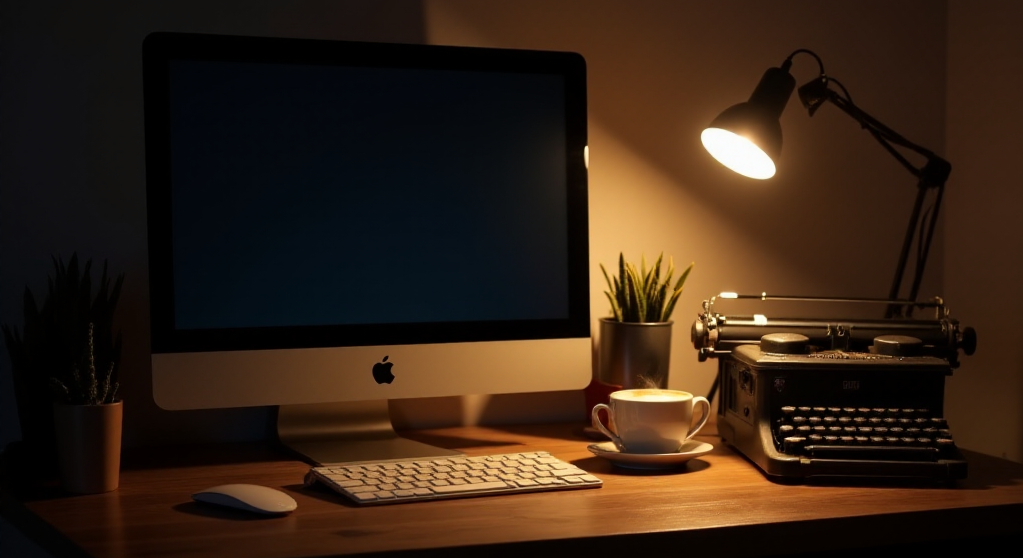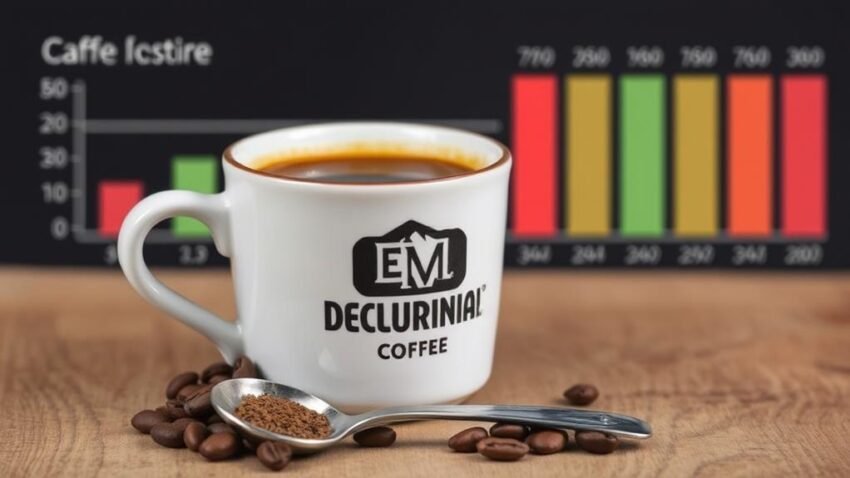If you're a coffee enthusiast looking for an intense kick, Devil Mountain Coffee is certainly worth considering. With a staggering 1555 mg of caffeine per 12 fl oz cup, it outshines most other coffee drinks by a wide margin. To put this into perspective, that's about six times the amount found in an average cup of coffee and notably higher than even specialty coffees like Arabica. However, such extreme levels of caffeine raise important questions about safety and appropriate consumption—questions that we'll explore further to help you decide if this brew is right for you.
Caffeine Content Overview
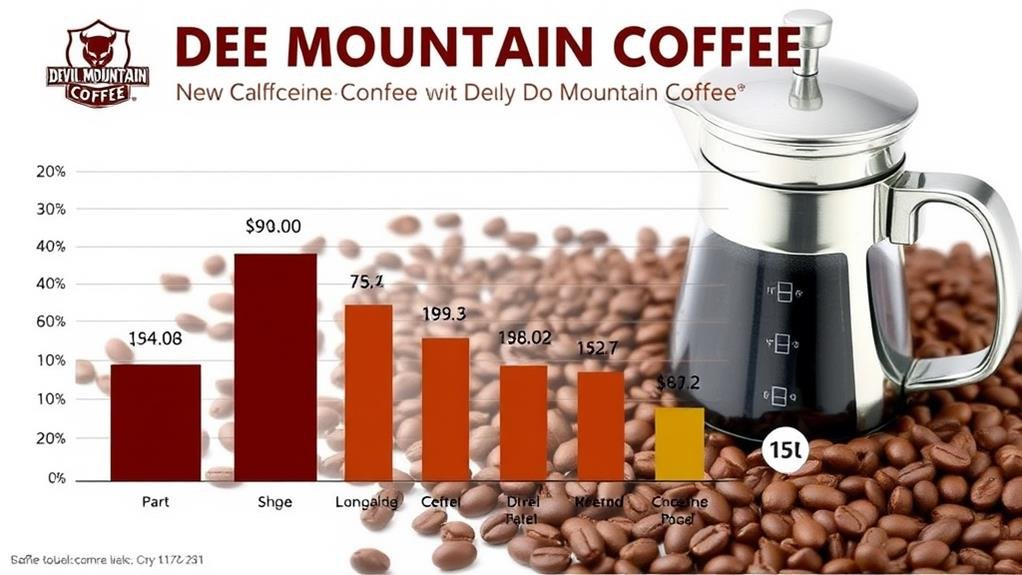
When it comes to the caffeine content of Devil Mountain Coffee Black Label, one thing stands out: it packs a punch. Each 12 fl oz cup contains a whopping 1555 mg of caffeine. To put this into perspective, that's 129.58 mg of caffeine per fl oz and 438.17 mg per 100 ml. This is higher than what you'd find in most other popular coffee drinks. The high caffeine levels in Devil Mountain Coffee are an important factor to keep in mind, especially for coffee lovers who often seek out unique flavors and robust profiles like those found in Arabica coffee varieties. If you're sensitive to caffeine or drink coffee regularly, this coffee might not be suitable for daily consumption. It's important to be mindful of your caffeine tolerance when trying Devil Mountain Coffee Black Label.
For those who enjoy a strong, high-caffeine coffee, this label coffee offers an intense experience. However, it's vital to approach with caution and perhaps start with a smaller amount to gauge your tolerance. The concentrate of caffeine makes it a product that demands respect and careful thought before consumption. Understanding these facts can help you make informed decisions about whether Devil Mountain Coffee Black Label is right for you.
Comparison to Average Coffee
Devil Mountain Coffee Black Label stands out dramatically when compared to the average cup of coffee. To put it into perspective, a single 12 fl oz cup of Devil Mountain Coffee contains an impressive 1555 mg of caffeine. This amount is staggering when you consider that it is six times the caffeine found in an average cup of coffee. The intense caffeine content can be compared to various specialty coffees like Arabica coffee, which are known for their intricate flavors rather than their caffeine levels.
For those who are accustomed to the typical amount of caffeine, Devil Mountain Coffee's content can be overwhelming. The average cup of coffee generally contains around 200-250 mg of caffeine, making Devil Mountain Coffee notably more potent. This extreme amount of caffeine means that individuals with low caffeine tolerance should avoid it altogether.
Understanding this comparison is vital because it highlights why Devil Mountain Coffee is considered the strongest coffee globally. It exceeds the recommended daily intake by more than three times, as per guidelines from reputable health institutions like the Mayo Clinic. If you're looking for a coffee that packs a serious punch, Devil Mountain Coffee is it; however, if you're sensitive to caffeine, it's best to steer clear.
Health Risks and Warnings
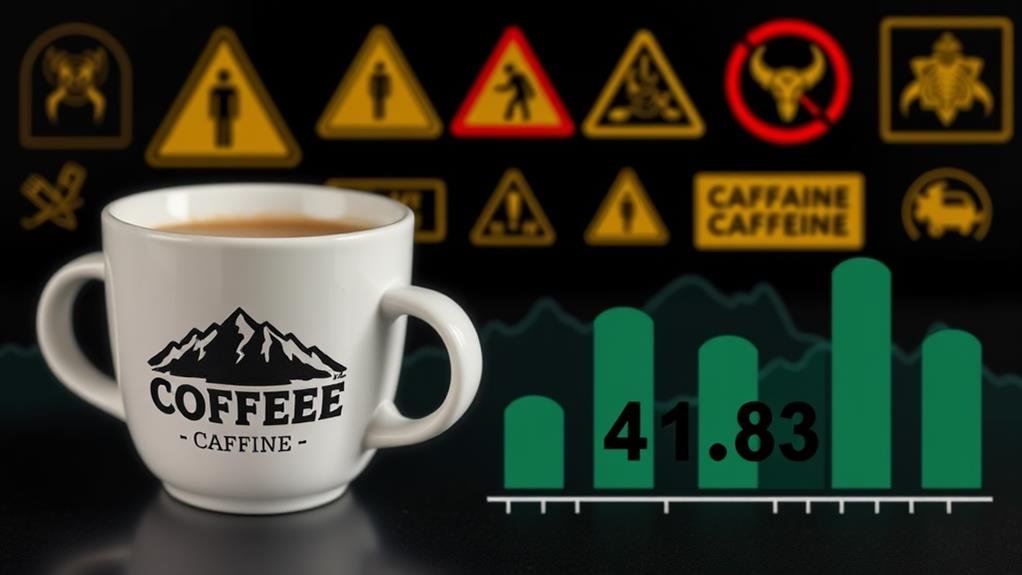
Consuming Devil Mountain Coffee, with its excessively high caffeine content, poses significant health risks. If you drink this coffee, you're at a higher risk of caffeine overdose, which can lead to severe symptoms like jitters, restlessness, and trouble sleeping. Additionally, individuals with low caffeine tolerance or certain health conditions should avoid it altogether to prevent potential harm.
Caffeine Overdose Risks
Given its high caffeine content, drinking Devil Mountain Coffee poses significant health risks, particularly if you're sensitive to caffeine or have certain health conditions. With 1555 mg of caffeine per serving, which is more than three times the recommended daily intake by Mayo Clinic, the potential for a caffeine overdose is substantial.
Caffeine overdose risks from Devil Mountain Coffee are real and should not be taken lightly. High levels of caffeine can lead to jitters, restlessness, and trouble sleeping, which can be particularly problematic for individuals with low caffeine tolerance or pre-existing sleep issues. Additionally, those with sensitive stomachs may experience adverse reactions that could exacerbate other health conditions.
Excessive caffeine intake from Devil Mountain Coffee is linked to various health issues and may not be suitable for everyone. It is essential to consult a healthcare provider before consuming this product, especially if you have existing health conditions. Understanding the potential risks associated with high caffeine content in Devil Mountain Coffee can help you make informed decisions about your caffeine intake and protect your health. Always prioritize caution when dealing with such potent stimulants.
Health Condition Considerations
If you have existing health conditions or specific sensitivities, it's essential to take into account the potential risks associated with drinking Devil Mountain Coffee. This coffee contains a substantial amount of caffeine—1555 mg, which is more than three times the daily recommended intake by the Mayo Clinic. Such high caffeine intake can exacerbate various health issues.
Individuals with low caffeine tolerance, sleep problems, or sensitive stomachs should avoid Devil Mountain Coffee altogether. High levels of caffeine can lead to jitters, restlessness, trouble sleeping, and upset stomachs—symptoms that could worsen if you're already vulnerable to these conditions. Additionally, pregnant women are advised against consuming Devil Mountain Coffee due to the risks of excessive caffeine.
Given these considerations, it's vital to consult a healthcare provider before adding Devil Mountain Coffee to your routine. They can help determine whether this high-caffeine beverage is safe for your specific health conditions and offer personalized advice. By being mindful of your caffeine intake and its potential impact on your health, you can make informed decisions about your coffee consumption. Always prioritize your well-being when considering such potent beverages.
Recommended Consumption Guidelines
When it comes to Devil Mountain Coffee, caution is key. This coffee is not for everyone, especially given its exceptionally high caffeine content of 1555 mg per 12 fl oz cup. To put this into perspective, it contains six times the caffeine found in an average cup of coffee.
Given the extreme caffeine levels, following recommended consumption guidelines is essential. If you're considering trying Devil Mountain Coffee, it's important to assess your caffeine tolerance first. Individuals with low caffeine tolerance, sleep issues, or sensitive stomachs should avoid it altogether due to the risk of adverse effects.
Before indulging in such a potent beverage, consulting a healthcare provider is advisable. They can provide personalized advice based on your health profile and help you make an informed decision. It's also crucial to start with a small amount to gauge your body's reaction before increasing consumption.
Caffeine per Serving Size
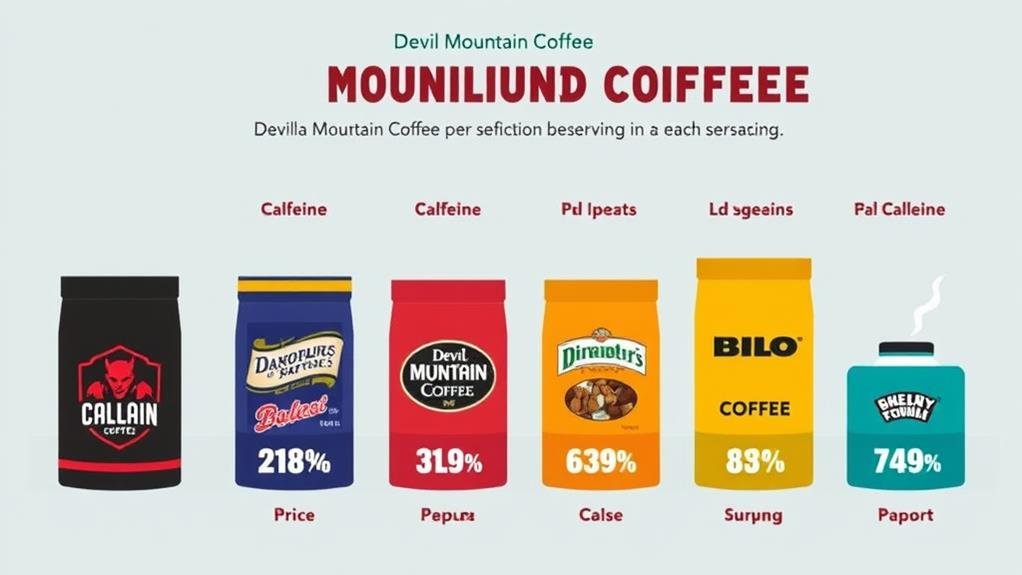
Caffeine per serving size is a crucial factor to take into consideration when consuming Devil Mountain Coffee. This coffee is highly caffeinated, making it essential to understand the precise amount of caffeine you're getting per cup.
- Caffeine Content Per Cup: Devil Mountain Coffee Black Label contains 1555 mg of caffeine in a 12 fl oz cup.
- Caffeine Concentration: This equates to 129.58 mg of caffeine per fl oz.
- Metric Conversion: When converted to milliliters, this is approximately 438.17 mg of caffeine per 100 ml.
- Comparison: This level is notably higher than what you'd find in other beverages and more than three times the recommended daily intake by Mayo Clinic.
Given these figures, it's evident why Devil Mountain Coffee is considered the strongest coffee globally. If you're planning to consume it, knowing the precise amount of mg of caffeine in each serving will help you gauge your intake accurately. Always consider your sensitivity and daily limits when opting for such a highly caffeinated beverage.
Comparison to Energy Drinks
When comparing the caffeine content of Devil Mountain Coffee to energy drinks, it's evident that it stands out notably. For example, a 12 fl oz cup of Devil Mountain Coffee contains 1,555 mg of caffeine, which is approximately 9.72 times higher than what you'd find in a similar-sized can of Monster energy drink. This difference underscores the importance of reflecting on health risks associated with consuming such elevated levels of caffeine in a single serving.
Energy Drink Caffeine Levels
If you're looking for a serious caffeine boost, Devil Mountain Coffee stands out noticeably when compared to popular energy drinks. While energy drinks are known for their energizing effects, Devil Mountain Coffee delivers an intense caffeine kick that far exceeds what you'd find in most energy beverages.
Let's take a look at the energy drink caffeine levels to put this into perspective:
- Monster Energy: 160 mg per serving
- Red Bull: 80 mg per serving
- Instant Coffee: 60 mg per serving
- Coca-Cola: 35 mg per serving
These amounts are paltry compared to the 1555 mg of caffeine found in a single 12 fl oz cup of Devil Mountain Coffee. This makes Devil Mountain Coffee one of the strongest coffee options available, offering a remarkably higher concentration of caffeine than any of these popular energy drinks. If you're seeking an intense caffeine kick, Devil Mountain Coffee is unquestionably the superior choice. Its high caffeine content sets it apart as a potent brewing option, making it ideal for those who need a robust boost to start their day or power through intense activities.
Caffeine Comparison Chart
To better visualize the stark difference in caffeine content between Devil Mountain Coffee and popular energy drinks, let's create a comparison chart. This chart will help you understand just how much more caffeine is packed into Devil Mountain Coffee Black Label compared to other common beverages.
Here's a breakdown of the caffeine content:
- Devil Mountain Coffee Black Label: 1555 mg per 12 fl oz
- Monster Energy Drink: 160 mg per 16 fl oz (approximately)
- Red Bull Energy Drink: 80 mg per 8.4 fl oz
When you look at these numbers, it's evident that Devil Mountain Coffee Black Label has an exceptionally high caffeine content. For instance, if you normalize the values to a standard serving size of 12 fl oz:
- Devil Mountain Coffee Black Label: 1555 mg
- Monster Energy Drink: About 120 mg (adjusted for a 12 fl oz serving)
- Red Bull Energy Drink: About 114 mg (adjusted for a 12 fl oz serving)
This caffeine comparison chart highlights that Devil Mountain Coffee Black Label contains notably more caffeine than both Monster and Red Bull energy drinks. If you're looking for a potent coffee experience, this should be a key consideration. Always be mindful of such high caffeine content to align with your daily intake needs.
Health Risks Considered
Consuming Devil Mountain Coffee presents substantial health risks due to its exceptionally high caffeine content. With 1555 mg of caffeine in each serving, it far surpasses the daily limit recommended by the Mayo Clinic, which is 400 mg. This excessive caffeine intake can lead to several adverse effects.
- Jitters and Restlessness: High levels of caffeine can cause nervous system overactivity, leading to feelings of jitters and unease.
- Sleep Issues: Consuming such a high amount of caffeine can greatly disturb sleep patterns, making it challenging to fall asleep or stay asleep.
- Stomach Problems: The caffeine in Devil Mountain Coffee can irritate the stomach, causing upset stomachs and other gastrointestinal problems.
- Special Considerations: Individuals with low caffeine tolerance, sleep issues, or sensitive stomachs should avoid this coffee entirely. Additionally, individuals with existing health conditions, pregnant women, and those who already exceed their daily caffeine limit from other sources are at increased risk.
Given these potential health risks, it is essential for consumers to be mindful of the caffeine content in Devil Mountain Coffee and to evaluate their own health status before consumption.
Suitability for Coffee Lovers
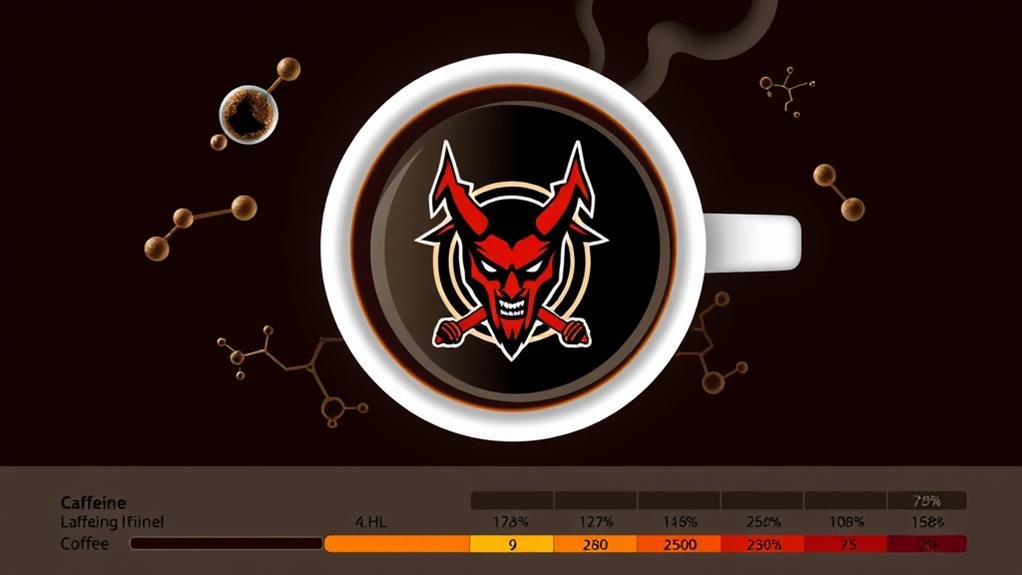
For coffee lovers seeking an intense caffeine jolt, Devil Mountain Coffee might be the ultimate choice. As the strongest coffee globally, it contains 1,555 mg of caffeine, which is equal to six times the amount in an average cup of coffee. This high caffeine content makes it a favorite among coffee connoisseurs who crave a bold and intense experience.
However, it's important to take into account the suitability of Devil Mountain Coffee for individual coffee lovers. Given its extreme caffeine levels, it is not recommended for everyone. Specifically, those with low caffeine tolerance, sleep issues, or sensitive stomachs should avoid it due to potential health risks. The Mayo Clinic recommends a daily caffeine intake that is significantly lower than what you'd get from just one cup of Devil Mountain Coffee.
Despite these cautions, enthusiasts of high caffeine coffee often praise its rich flavor and strength. If you're a coffee lover who can handle such a potent brew without adverse effects, Devil Mountain Coffee could be an exciting addition to your coffee repertoire. However, it's vital to approach with caution and be fully aware of the potential impact on your health. Always prioritize your well-being when exploring such robust beverages.
Potential Side Effects
Consuming Devil Mountain Coffee can lead to several side effects due to its high caffeine content. If you're sensitive to caffeine, you might experience jitters and restlessness, which can be particularly bothersome if you're not accustomed to such levels. Additionally, caffeine can disrupt sleep patterns and cause stomach upset, making it crucial to take into account these potential impacts before drinking.
Jitters and Restlessness
High caffeine intake from Devil Mountain Coffee can induce jitters and restlessness, a common issue for many who dare to test its extreme caffeine content of 1,555 mg. This intense level of caffeine can greatly influence your daily activities, making it challenging to focus or relax.
Excessive caffeine consumption, particularly from Devil Mountain Coffee, triggers several symptoms that you should be aware of:
- Heightened Alertness: You may feel extremely alert and awake, which can be overpowering.
- Nervousness: Excessive caffeine can cause feelings of nervousness, which could make you feel on edge.
- Jitteriness: The high caffeine content may cause physical jitters, such as shaky hands or an uneven heartbeat.
- Impact on Daily Activities: These side effects can interfere with your ability to perform daily tasks smoothly.
Individuals sensitive to caffeine should exercise caution when consuming Devil Mountain Coffee. The extreme caffeine levels in this coffee can result in jitters and restlessness, especially in those with low caffeine tolerance. It's important to be mindful of these potential side effects to avoid disrupting your routine or overall well-being.
Sleep Disturbances
Devil Mountain Coffee's high caffeine content of 1,555 mg can greatly affect your sleep. Consuming this coffee can lead to significant sleep disturbances, a common issue for those who are sensitive to caffeine. The excessive amount of caffeine found in Devil Mountain Coffee is similar to other extremely caffeinated coffees like Death Wish, which also pose risks to sleep quality.
When you drink Devil Mountain Coffee, the 1,555 mg of caffeine can cause restlessness and make it difficult for you to fall asleep. This is because such a high intake of caffeine can disrupt your natural sleep patterns and lead to insomnia. Individuals who are particularly sensitive to caffeine may experience even more severe sleep disturbances after consuming this coffee.
To avoid these issues, it is recommended not to drink Devil Mountain Coffee before bedtime. If you're looking to enjoy this coffee without compromising your sleep, consider having it earlier in the day. This way, the effects of the caffeine will have time to wear off before you go to bed. By being mindful of your caffeine intake and timing, you can avoid sleep disturbances and other potential side effects associated with excessive caffeine consumption.
Stomach Upset
While sleep disruptions are a significant issue for those who consume Devil Mountain Coffee, another possible side effect to take into consideration is stomach discomfort. The high caffeine concentration in Devil Mountain Coffee can be especially troublesome for individuals with delicate stomachs. Excessive consumption can result in various digestive problems that may disrupt your daily activities.
Here are some key points to bear in mind:
- Stomach Discomfort: High caffeine levels can lead to stomach discomfort, which is a common side effect for many users.
- Digestive Challenges: Overindulging in caffeine from Devil Mountain Coffee can cause acid reflux and heartburn.
- Gastrointestinal Distress: Some people may experience bloating, queasiness, or other gastrointestinal discomfort due to the potent caffeine levels.
- Precaution for Delicate Stomachs: If you are prone to stomach problems, it's important to proceed with care when consuming Devil Mountain Coffee to avoid potential digestive issues.
Understanding these possible side effects can assist you in making informed choices about your caffeine intake and ensuring that you enjoy Devil Mountain Coffee without jeopardizing your well-being. If you do encounter any of these symptoms, it might be wise to adjust your consumption or explore alternative beverage options.
Daily Caffeine Limit Exceeded
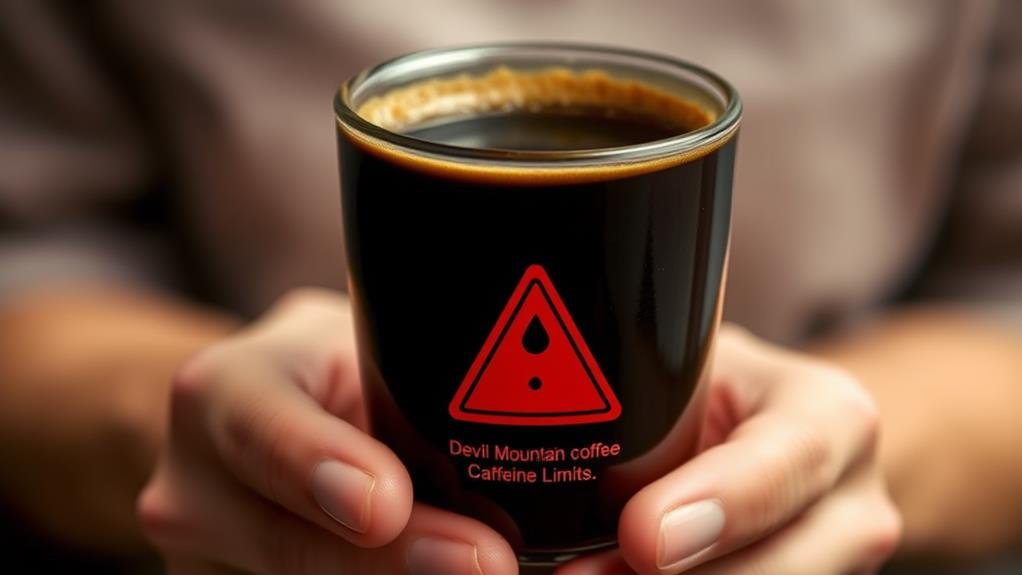
When you choose to drink Devil Mountain Coffee Black Label, you're likely to exceed the daily recommended caffeine intake by a significant margin. According to the Mayo Clinic, the daily caffeine limit is far surpassed by the 1,555 mg of caffeine present in Devil Mountain Coffee Black Label. This high concentration of caffeine can lead to several adverse effects, such as jitters, restlessness, trouble sleeping, and stomach upset.
Individuals with low caffeine tolerance should be particularly cautious and avoid consuming Devil Mountain Coffee Black Label to prevent these adverse effects. Additionally, for those with existing health conditions, consuming this coffee may pose additional health risks due to its excessive caffeine content.
It is essential to be mindful of these risks and not exceed the recommended daily caffeine limit when considering Devil Mountain Coffee Black Label. Understanding the potential consequences of such high caffeine intake can help you make informed decisions about your coffee consumption. Always prioritize your health by adhering to recommended guidelines and being aware of how much caffeine you are ingesting each day.
Consulting Healthcare Providers
How can you guarantee it's safe to consume Devil Mountain Coffee Black Label? The key is consulting a healthcare provider, especially if you have any preexisting health conditions.
Devil Mountain Coffee is not recommended for individuals with health conditions, so it's vital to seek professional advice. Here are some reasons why:
- Assess Caffeine Tolerance: Healthcare providers can help determine your individual caffeine tolerance levels and offer guidance on safe consumption.
- Preexisting Conditions: If you have heart problems or high blood pressure, consulting a healthcare provider before trying Devil Mountain Coffee is crucial.
- Personalized Recommendations: Based on your health history and current medications, healthcare providers can provide personalized recommendations on caffeine intake.
- Prevent Adverse Reactions: Consulting a healthcare provider can help prevent adverse reactions or interactions due to the high caffeine content in Devil Mountain Coffee.
Conclusion
Devil Mountain Coffee is like a speeding bullet in the world of caffeine—powerful and potent, but also potentially hazardous if not handled carefully. Imagine it as a revered warrior: mighty and strong, yet capable of causing great harm if misdirected. Its immense caffeine content demands respect and caution, reminding us that even the most potent allies can become formidable foes if not used wisely. Always consume with mindfulness and consult healthcare providers before indulging.
